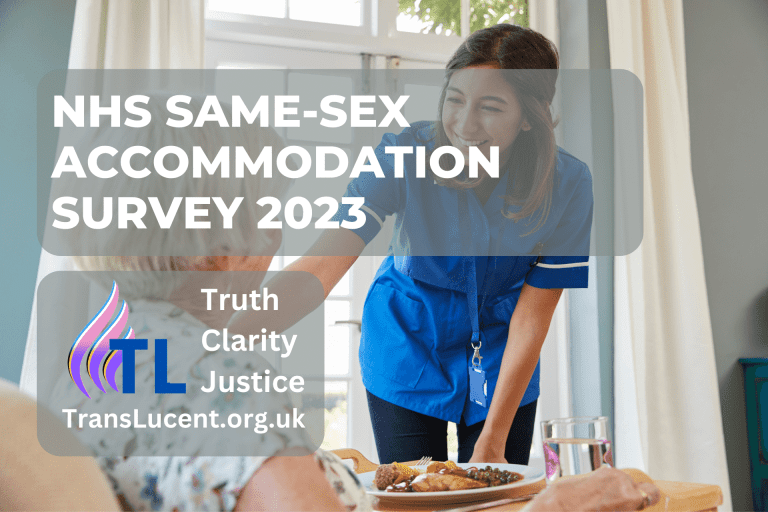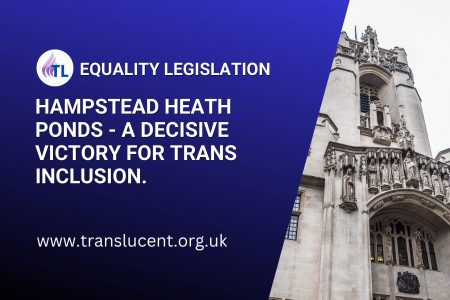Our NHS Same-Sex Accommodation Survey Dec 2023 – methodology and responses received
Methods
Identifying the target NHS trusts
We wanted to approach the NHS organisations responsible for the vast majority of inpatient NHS care, in order to ask about complaints received in respect of trans women’s use of the wards and the other accommodation which are required when people stay in hospital or other inpatient facilities. The results of this survey are discussed in our article Carry on nurse: the non-problem of trans women and NHS same-sex accommodation.
In England, these organisations are referred to as ‘acute’ and ‘mental health’ trusts. Each of these trusts is responsible for running one or more hospitals and/or other inpatient facilities.
We restricted our survey to England, as our intention was to use the results of the survey to inform our response to a forthcoming consultation on planned changes to The NHS Constitution for England, announced in October 2023.
Currently-operating trusts (technically, both NHS trusts and Care trusts) were identified from NHS Organisation Data Service files1. The trusts’ websites were consulted to establish the email or web addresses to be used for Freedom of Information (FOI) requests.
Currently-operating trusts (technically, both NHS trusts and Care trusts) were identified from NHS Organisation Data Service files. The trusts’ websites were consulted to establish the email or web addresses to be used for Freedom of Information (FOI) requests.
Acute trusts
The subset of acute trusts (responsible for ‘ordinary’ hospitals, and specialist centres such as eye hospitals and heart hospitals) was identified using the list specified by NHS England in their referral to treatment waiting time data for September 20232.
From this list of 135 trusts, we excluded three specialist children’s trusts. While same sex accommodation is relevant to these organisations, the parameters under which it is deployed are somewhat different for children. Additionally, the proportion of complaints coming from parents, rather than patients, is likely to be much larger in the case of specialist children’s trusts. To protect the simplicity of the FOI request we were making, and thereby maximise the number of trusts able to respond to it, we elected to focus the survey on trusts with responsibility for adult inpatient care.
We additionally excluded two specialist women’s trusts (one of which was also a specialist children’s trust). While it is possible that one or more trans women will have been inpatients at these trusts during the survey period, the nature of the medical specialties covered by these trusts makes it unlikely. To avoid any concern that we had surveyed organisations which were by their nature unlikely to return a number of complaints other than zero, we decided to focus the survey on trusts with responsibility for the inpatient care of both men and women.
The resulting list of 130 acute trusts polled can be seen in our tabulation of trust responses, below.
Mental health trusts
The subset of mental health trusts was identified by considering trust-level ranked data on the number of ‘mental illness’ overnight beds,3 finished consultant episodes in mental health specialties,4 and admissions to hospital reported via the mental health services monthly statistics for July 2023.5 While these individual sources were each subject to errors of omission, combining them using a rule that included any trust which was outside the lowest quintile in at least two of three sources, provided an apparently valid list of 49 trusts which differed from a Royal College of Psychiatrists briefing from 2021 only in ways that could be explained by known changes over time.
To this list we added a single trust (Isle of Wight NHS Trust) which uniquely acts as both an acute and a mental health trust. Note that in our reporting of this survey we have counted a single response from this trust twice – once as an acute trust and once as a mental health trust.
The resulting list of the 50 mental health trusts surveyed is shown below in the tabulation of trust responses.
Survey questions
In the week commencing 20/11/2023, FOI requests were sent to each of the acute and mental health trusts.
In each case the trust was asked to examine the complaints it had received in the 12 months to the 31/08/2023 (inclusive). This review period was specified to provide a sufficiently reliable and contemporary snapshot of complaints activity, while avoiding the very most recent activity, which might have been less accessible for trusts attempting to respond to our query within FOI resource limits.
In respect of this period, acute trusts were asked:
How many women inpatients complained that a trans woman inpatient was being cared for in the same ward as the complainant?
Mental health trusts (including Isle of Wight NHS Trust) were asked three questions:
- How many women inpatients complained that a trans woman inpatient was sharing the same sleeping accommodation as the complainant?
- How many women inpatients complained that a trans woman inpatient was using the same women-only day room(s) that had been made available to the complainant?
- How many women inpatients complained about both of the aspects of their care referred to in questions 1) and 2)?
In all cases, it was additionally noted that:
- The questions were posed in reference to written complaints (which may have been originally made orally and subsequently recorded in writing) received by the trust.
- The terms ‘sleeping accommodation’ and ‘women-only day rooms’ were being used in the same sense that they are used in NHS England’s 2019 guidance Delivering same-sex accommodation.
Responses
At 24/01/24, 167 trusts (93%) have responded to our request for information. Of these, 10 trusts formally declined to answer the FOI request, in most cases claiming a section 12 exemption (the costs of responding were estimated to exceed the appropriate limit).
Of the 157 trusts (87%) responding substantively to our request, one (The Shrewsbury and Telford Hospital NHS Trust; an acute trust) reported a single relevant complaint had been received in the specified review period. All the others reported finding that no such complaints had been received.
The trusts polled, along with links to responses received are shown in the table below.
| Trust | NHS Code | Type | Response | View PDF |
|---|---|---|---|---|
| AIREDALE NHS FOUNDATION TRUST | RCF | Acute | Responded | |
| ASHFORD AND ST PETER'S HOSPITALS NHS FOUNDATION TRUST | RTK | Acute | Responded | |
| AVON AND WILTSHIRE MENTAL HEALTH PARTNERSHIP NHS TRUST | RVN | MH | Responded | |
| BARKING, HAVERING AND REDBRIDGE UNIVERSITY HOSPITALS NHS TRUST | RF4 | Acute | Responded | |
| BARNET, ENFIELD AND HARINGEY MENTAL HEALTH NHS TRUST | RRP | MH | Responded | |
| BARNSLEY HOSPITAL NHS FOUNDATION TRUST | RFF | Acute | Responded | |
| BARTS HEALTH NHS TRUST | R1H | Acute | Responded | |
| BEDFORDSHIRE HOSPITALS NHS FOUNDATION TRUST | RC9 | Acute | Responded | |
| BERKSHIRE HEALTHCARE NHS FOUNDATION TRUST | RWX | MH | Responded | |
| BIRMINGHAM AND SOLIHULL MENTAL HEALTH NHS FOUNDATION TRUST | RXT | MH | Responded | |
| BLACK COUNTRY HEALTHCARE NHS FOUNDATION TRUST | TAJ | MH | Responded | |
| BLACKPOOL TEACHING HOSPITALS NHS FOUNDATION TRUST | RXL | Acute | Responded | |
| BOLTON NHS FOUNDATION TRUST | RMC | Acute | Responded | |
| BRADFORD DISTRICT CARE NHS FOUNDATION TRUST | TAD | MH | Responded | |
| BRADFORD TEACHING HOSPITALS NHS FOUNDATION TRUST | RAE | Acute | Responded | |
| BUCKINGHAMSHIRE HEALTHCARE NHS TRUST | RXQ | Acute | Responded | |
| CALDERDALE AND HUDDERSFIELD NHS FOUNDATION TRUST | RWY | Acute | Responded | |
| CAMBRIDGE UNIVERSITY HOSPITALS NHS FOUNDATION TRUST | RGT | Acute | No response | — |
| CAMBRIDGESHIRE AND PETERBOROUGH NHS FOUNDATION TRUST | RT1 | MH | Responded | |
| CAMDEN AND ISLINGTON NHS FOUNDATION TRUST | TAF | MH | Responded |
Follow-up question
In the case of the single trust that had received a relevant complaint, we sent a follow-up question:
In respect of the single complaint identified in the response of 12/12/23 (ref. 23-1130), were any of the matters complained about therein subject to investigation, reporting or designation as a ’Serious Incident’, as per the NHS England Serious Incident Framework (2015)? For clarity, I should note that my question relates to all such investigations and/or reporting whether the relevant activity is completed, in progress or planned.
The query was couched in terms of NHS England’s Serious Incident Framework, as we understood from published Board papers that the trust continued to operate under this framework during the period queried in our earlier request, with a switch within the trust to the NHS’s newer ‘Patient Safety Incident Response Framework’ (PSIRF) occurring at a later date.
The trust responded that the “The single complaint identified in our response to your request reference 23-1130 was not subject to any investigation, reporting or designation as a serious incident.”
References
1 ‘Other NHS Organisations’, NHS Digital <https://digital.nhs.uk/services/organisation-data-service/export-data-files/csv-downloads/other-nhs-organisations> [accessed 1 November 2023].
2 ‘Statistics » Consultant-Led Referral to Treatment Waiting Times Data 2023-24’, NHS England <https://www.england.nhs.uk/statistics/statistical-work-areas/rtt-waiting-times/rtt-data-2023-24/#Sep23> [accessed 13 November 2023].
3 ‘Statistics » Bed Availability and Occupancy Data – Overnight’, NHS England <https://www.england.nhs.uk/statistics/statistical-work-areas/bed-availability-and-occupancy/bed-data-overnight/> [accessed 12 November 2023].
4 ‘Hospital Admitted Patient Care Activity, 2022-23’, NHS Digital <https://digital.nhs.uk/data-and-information/publications/statistical/hospital-admitted-patient-care-activity/2022-23> [accessed 7 November 2023].
5 ‘Mental Health Services Monthly Statistics , Performance June, Provisional July 2023’, NHS Digital <https://digital.nhs.uk/data-and-information/publications/statistical/mental-health-services-monthly-statistics/performance-june-provisional-july-2023> [accessed 7 November 2023].
6 ‘NHS Mental Health Trusts- CQC Ratings’, Mental Health Watch <https://mentalhealthwatch.rcpsych.ac.uk/indicators/nhs-mental-health-trusts-cqc-ratings> [accessed 7 November 2023].











 To provide the best experiences, we use technologies like cookies to store and/or access device information. Consenting to these technologies will allow us to process data such as browsing behaviour or unique IDs on this site. Not consenting or withdrawing consent, may adversely affect certain features and functions.
To provide the best experiences, we use technologies like cookies to store and/or access device information. Consenting to these technologies will allow us to process data such as browsing behaviour or unique IDs on this site. Not consenting or withdrawing consent, may adversely affect certain features and functions.